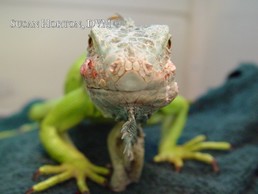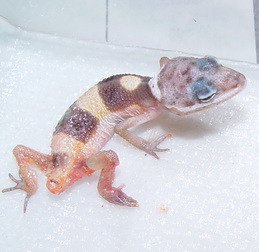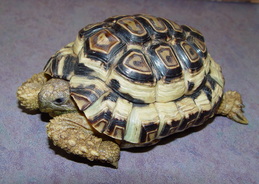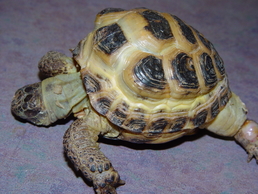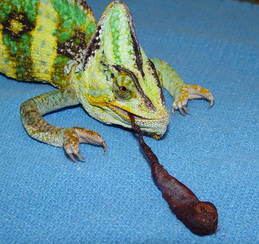Metabolic Bone Disease Care
Home care for green iguanas and other reptiles with secondary nutritional hyperparathyroidism
Initially I wrote this send home sheet for Green Iguanas since they were the ones I most often saw with this problem. Of course many more species are effected by this disease. It is purely a disease of inadequate husbandry. This disease syndrome affects any reptile but most especially those reptiles with a very fast growth rate including but not limited to: Sulcata tortoises, Leopard Tortoises, Bearded Dragons, Leopard Geckos, Chameleons, frogs, Thai Water Dragons, and of course Green Iguanas.
|
Your reptile has been diagnosed with a metabolic condition that took many months to develop. It is critically deficient in calcium and/or vitamin D 3. Young reptiles have a tremendous need for calcium as they grow. When calcium is not available to them, they start to remove calcium from their own bones. This causes them to become soft and rubbery. They fracture easily. Muscle also needs calcium to function properly. A calcium deficient reptile will tremor, have difficulty eating, walking, defecating, and urinating. Diet, as well as environment both have contributed to creating this disease state.
The recovery process may take months. Many pets recover completely. Some are left with permanent deformities or nervous deficits. Some will die. During the recovery process, your reptile will need you to help feed it and nurse it back to health. Some reptiles take weeks before they start to gain weight and eat well on their own. Their recovery hinges on providing the correct environment and nutrition. This handout will help you through the critical stages of recovery. Medications
Calcium supplementation
Feeding
Hand feeding-choices for syringe feeding
Soak your reptile in warm water for 20 minutes once to twice daily. The water should not be above its shoulders. If it is very weak, you will need to monitor it the whole time or hold up its head to make sure it does not drown. Environment
Remove all climbing materials. Your reptile is delicate in this condition and will fracture from falls. Provide a UVB source such as the fluorescent Reptisun or mercury vapor bulb (even for geckos, though lower intensity needed). There can be no glass or plastic between the light and the reptile. The reptile should be no more than 12 inches away from the light, but no closer than 2 inches. On sunny, warm days (80°F +), the reptile can bask outside. Do not put it outside in an aquarium-it will cook. Allow access to water and shade. Provide predator protection. They are fast when they warm up, be careful! Proper temperature gradient in the cage is important. Follow the recommended temperature gradient for the species you keep. For Green Iguanas, there should be a hot spot that reaches 95°F – 100°F. The low-end temperature of the cage should be 80°F. Do Not Use a Hot Rock for any species!!!! Spot light bulbs coupled with under the tank heating systems work well. A thermostat is recommended. You should have multiple thermometers to measure your temperature gradient. The reptile should be kept alone during recovery. Undo stress from larger cage mates will hinder its recovery and/or continued health. There should be a hiding place. Sometimes covering up half the enclosure helps the reptile to feel more secure. Often times, small reptiles respond to us as if we were predators. Until it gets used to you, give it security. Thank you for giving us the opportunity to provide helpful service to you and your pet. Please follow through with you pet’s rechecks as they are important in its recovery. If you have any questions, please feel free to call us at 847-329-8709. |

